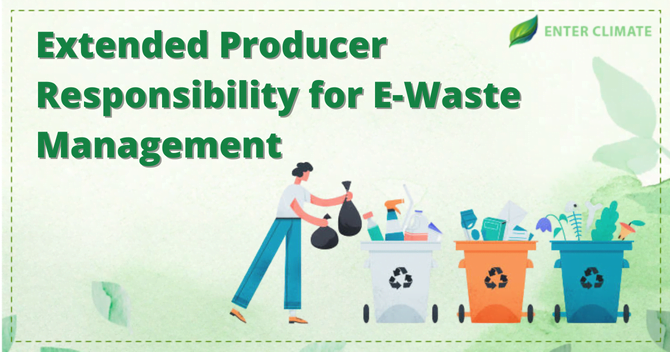Relevance of the EPR Capacity Building in India’s mission towards Circular Economy
 04 Sep, 2023
04 Sep, 2023 
The United Nations defines capacity building as the process of developing and strengthening the skills, instincts, abilities, processes and resources that organisations and communities need to survive, adapt, and thrive in a fast-changing world. There have been many programs by the government towards this cause in the different sectors that aim to supplement skill development, better remunerative prices, and protection against unethical and destructive market policies. When we look at the waste management sector, there are many challenges faced by the producers, bulk consumers, ULB and waste management entities in formal and informal streams.
The introduction of EPR led to the shifting of responsibility for waste management from the government and municipalities to the producers of the goods. As the EPR Capacity building program aims to create a more sustainable and efficient approach to waste management, EPR related to the obligation of Producers, Importers, and Brand Owners (PIBOs) includes managing post-consumer waste through environmentally friendly disposal or recycling practices.
The EPR regime is in force in 4 sectors, i.e. plastic packaging, electronic and electrical products, tyres and batteries. EPR obligations in the form of waste management targets and compliances have been imposed on producers, importers, brand owners and waste recyclers. The efforts for the EPR Capacity building program in these sectors should also aim to create circular economies in the respective sectors.
For instance, under the Plastic Waste Management Rules 2016 and subsequent amendments, apart from ensuring that manufacturers/producers shoulder the responsibility of handling plastic waste, including its collection, safekeeping, transportation, and processing, also focus on the chemistry of the waste and talk about awareness on types of recyclables, personal protective equipment, associated hazards and health risks. Therefore, a capacity-building approach in the sectors governed by EPR must encompass four crucial components:
- Education and training of the workforce
- Development of Human Resources
- Management of Knowledge
- Establishment of Knowledge Networks
Approach to the EPR Capacity Building Program
Any strategy for enhancing capacity under EPR should focus on the following approaches in addition to the use of technology. The approach should also involve:
- Understanding the administrative frameworks associated with Extended Producer Responsibility and its interconnected activities, incorporating a multidisciplinary and cross-sectoral approach.
- Recognising the necessity of developing human resources to enhance outcomes within EPR.
- Emphasising the establishment of effective institutions and practising good governance to advance EPR.
- Crafting approaches to ensure the enduring continuity of accomplishments.
Role of EPR Action Plan in Capacity Building
An EPR Action Plan generally functions as a producer’s blueprint for handling the accumulation, processing, and routing of e-waste generated within their facility. The key objectives of the EPR plan in the EPR Capacity building program are as follows:
- Accurately estimating the quantity of e-waste generated by consumers.
- Developing a structured scheme for systematically accumulating and routing e-waste with identical Electrical and Electronic Equipment (EEE) codes to authorised recyclers.
- Allocating a projected budget to ensure smooth implementation of EPR.
- Crafting strategies to raise awareness about the prevention and management of waste.
- Ensuring that producers comply with the provisions meant for restriction of Hazardous Substances (RoHS) regulations and submit a corresponding declaration along with the requisite documentation.
EPR Action plans can take various forms depending on the type of waste, including mandatory product take-back regulations, deposit return schemes, use of economic and market-driven tools and regulatory standards, and information-based strategies.
As manufacturers retain the right to periodically revise their EPR plans, identifying the bottlenecks in the implementation of EPR and redesigning their EPR plan considering the scope of capacity building for the workforce will help sustain the business in the long run, bringing profit for product manufacturers as well as the recyclers.
The EPR Capacity building program, therefore, should encompass enhanced waste collection and treatment process, fast-tracking the pace of recycling, increasing the rates of waste recycling and reuse, incentivizing the creation of eco-friendly products, facilitating financial support for waste management, securing higher-quality secondary raw materials, generating employment opportunities, and diminishing health risks associated with mismanaged waste.
Roles of different stakeholders in the EPR Capacity Building Program
For a successful EPR capacity building program, the participation of various stakeholders is essential. National governments play a crucial role in establishing the policy and legal foundation. Meanwhile, local municipalities[1] frequently handle waste collection from households and businesses. The private sector has also shifted its focus on capacity building as they realise that sustainability is the only way forward.
EPR Capacity Building under the Government
Establishing the policy and legal structure involves multiple aspects:
- Identifying the relevant producers and products
- Allocating explicit responsibilities to producers, which might involve quantified objectives for take-back, waste collection, and recycling
- Specifying the roles of other participants, like local municipalities and the informal waste sector
- Holding essential dialogues with these stakeholders
- Ensuring accreditation, approval, and ongoing supervision of EPR schemes to maintain effective operation and ensure adherence
- Implementing measures to counter the unlawful import of packaging or packaging waste.
EPR Capacity Building under Local Municipalities
Commonly, their responsibilities encompass waste collection from both households and businesses, involving tasks such as:
- Establishing easily accessible infrastructure for collection and segregation (at source)
- Furnishing the public with relevant information on the benefits of waste management
Producers/Business (including manufacturers, consumer goods companies and retailers/distributors)
These entities bear the legal responsibility of fulfilling the government-set objectives and targets. Capacity building in this sector can involve tasks like:
- Formulating EPR schemes could involve establishing non-profit or for-profit producer responsibility organisations (PROs) for collective EPR approaches.
- Overseeing and operating EPR schemes, which might encompass determining registration and product fees, collecting fees (usually from companies producing consumer goods),
- Collaborating with waste collectors/processors, reporting collection and recycling rates, and potentially facilitating the return of waste packaging (in cases involving retailers/distributors).
- Fulfilling fees payable to EPR schemes based on the type of good they introduce to the market.
- Dispensing information to both consumers and recyclers regarding the utilisation of EPR schemes can lead to the recovery of resources crucial for the producer.
EPR Capacity building with Waste Management Consultants
Waste Management Consultants play an essential role in implementing an EPR Capacity Building Program by serving as a critical link between various stakeholders involved in the manufacturing and waste management sectors. A consultancy service operates as a facilitator and advisor, aiming to address the complexities and challenges faced by producers, recyclers, consumers, urban local bodies (ULBs), and other waste management entities.
By addressing the challenges faced by producers, recyclers, consumers, ULBs, and waste management entities, these consultants contribute to developing a more environmentally responsible and efficient waste management ecosystem.
EPR Capacity building for the Informal Sector (e.g., Waste Pickers)
- The informal sector participants have the most significant stake in the management of waste. When it comes to waste collection, segregation and disposal, India still has a huge workforce in the informal sector that still remains unaware of the waste management protocols, safety measures, government assistance, and provisions related to their rights under the EPR regime. Therefore, working towards their capacity building will allow them to engage in EPR schemes, possibly by contributing to the efficient collection of recyclable waste.
Setting up EPR Capacity Building Programs
Under the EPR regime, the process of implementing a capacity-building program involves several vital steps to equip stakeholders with the knowledge, skills, and resources needed for effective EPR implementation. Here’s an overview of the process:
- Assessment and Planning:
- Identify critical players: Determine the relevant parties involved in EPR, such as producers, government agencies, ULBs recyclers, and NGOs.
- Assess Current State: Evaluate stakeholders’ existing understanding and capabilities regarding EPR principles, waste management practices, and relevant regulations.
- Set Goals: Define the objectives of the capacity-building program, such as increasing awareness, enhancing technical skills, and improving compliance.
- Designing the Program:
- Curriculum Development: Create a comprehensive curriculum that covers various aspects of EPR, including policy framework, waste management techniques, recycling methods, reporting requirements, and environmental impacts.
- Training Modules: Divide the curriculum into modules or sessions, each focusing on a specific topic. Ensure the content is tailored to the needs of different stakeholders.
- Education and Training:
- Workshops and Seminars: Conduct workshops, seminars, webinars, and training sessions for different stakeholder groups. Experts in waste management, legal compliance, and environmental science can deliver these sessions.
- Policy and Legal Briefings:
- Explain EPR Framework: Provide an in-depth understanding of the EPR policy framework, including roles and responsibilities of stakeholders, regulatory requirements, and reporting obligations.
- Clarify Compliance: Explain the consequences of non-compliance and the benefits of adhering to EPR regulations.
- Technical Training:
- Waste Management Techniques: Train participants on efficient waste collection, sorting, recycling, and disposal methods.
- Recycling Technologies: Introduce innovative recycling technologies and processes to enhance resource recovery and reduce environmental impact.
- Data Management and Reporting:
- Data Collection and Analysis: Teach stakeholders how to collect accurate data on waste generation, collection rates, recycling rates, and other relevant metrics.
- Reporting Procedures: Guide how to compile and report data to regulatory authorities as required.
- Infrastructure Development:
- Facility Setup: Help set up collection centres, recycling facilities, and disposal sites based on best practices.
- Infrastructure Management: Train stakeholders on the maintenance and management of these facilities.
- Collaboration and Awareness:
- Networking Opportunities: Facilitate stakeholder interactions to foster collaboration, information sharing, and problem-solving.
- Consumer Awareness: Develop strategies for raising awareness among consumers about EPR, responsible consumption, and recycling practices.
- Monitoring and Evaluation:
- Progress Assessment: Regularly evaluate the effectiveness of the capacity-building program by tracking participants’ understanding, skills improvement, and compliance rates.
- Program Adjustment: Modify the program based on feedback and changing needs to ensure its continuous relevance and impact.
- Documentation and Reporting:
- Maintain Records: Document the training sessions, workshops, and stakeholder interactions for future reference and accountability.
- Reporting: Prepare reports on the program’s progress, achievements, and areas for improvement.
- Continuous Improvement:
- Learn from Experience: Use feedback and lessons to refine the program for subsequent iterations.
- Stay Updated: Keep stakeholders informed about evolving EPR regulations, technological advancements, and industry best practices.
Post-registration Obligations for the EPR License Holder
The Central Pollution Control Board (CPCB) mandates license holders to adhere to the following requirements:
- Manufacturers must adhere to the approved EPR plan.
- Producers are obliged to maintain documentation regarding the channelisation of waste. It’s important to note that recyclers also share this responsibility.
- Producers must maintain records under the respective waste management rules detailing electronic waste and present these records to the CPCB during inspections.
- Producers must submit yearly returns to the CPCB by June 30th of the subsequent fiscal year through the EPR portal.
Conclusion
Implementing an EPR capacity building program represents a pivotal step towards sustainable waste management and environmental conservation. By collaborating with various stakeholders, including national governments, local municipalities, producers, and recyclers, such programs effectively establish a responsible product lifecycle management framework. By adhering to well-defined guidelines, producers assume the responsibility for the entire lifecycle of their products, from design to disposal, thus promoting resource efficiency and minimising environmental impacts. The foundation of a successful EPR capacity building program lies in meticulous planning, comprehensive documentation, and consistent adherence to legal and regulatory requirements. Producers, importers, and other entities involved must work harmoniously to ensure that e-waste is collected, treated, and disposed of responsibly, thus mitigating the environmental challenges of electronic waste. This program contributes to reducing the strain on landfills and conserving valuable resources and fosters awareness among consumers about the significance of responsible consumption and disposal practices. It is highly recommended to take expert consultation while building an EPR Capacity program to ensure that all the compliances are dealt with together, and all requirements are considered.
Read our Article:EPR Registration For E-Waste Refurbishers In India













